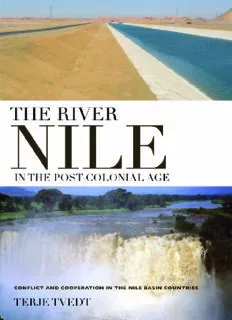
The River Nile in the Post-Colonial Age: Conflict and Cooperation in the Nile Basin Countries PDF
Preview The River Nile in the Post-Colonial Age: Conflict and Cooperation in the Nile Basin Countries
00c_River Nile_i-viii 15/10/09 14:09 Page i TerjeTvedt is Professor of Geography at the University of Bergen and Professor of Political Science at the University of Oslo. He is an international authority on the history and politics of water and the author of a number of successful books and films on water issues, includingThe River Nile in the Age of the British (I.B.Tauris, 2004), which was shortlisted for the British Society for Middle East Studies Prize 2004. Among his other books are The Nile: An Annotated Bibliography (revised edition, I.B.Tauris, 2003), Southern Sudan: An Annotated Bibliography(revisededition,2volumes,I.B.Tauris,2004)and,asserieseditor,A Historyof Water(I.B.Tauris,2006andforthcoming). 00c_River Nile_i-viii 15/10/09 14:09 Page ii 00c_River Nile_i-viii 15/10/09 14:09 Page iii The River Nile in the Post-Colonial Age Conflict and Cooperation among the Nile Basin Countries Edited by Terje Tvedt 00c_River Nile_i-viii 15/10/09 14:09 Page iv Publishedin2010byI.B.Tauris&Co.Ltd 6SalemRoad,LondonW24BU 175FifthAvenue,NewYorkNY10010 www.ibtauris.com DistributedintheUnitedStatesandCanadaExclusivelybyPalgraveMacmillan, 175FifthAvenue,NewYorkNY10010 Selectionandeditorialmattercopyright©2010TerjeTvedt Forewordcopyright©2010ToreSaetersdal Individualchapterscopyright©2010YacobArsano,HosamE.RabieElemam,JamesMulira, MaryC.Mwiandi,HonestProsperNgowi,PascalNkurunziza,RobertBaligira,FadwaTaha, RaphaelM.Tshimanga,TerjeTvedt Theboundaries,namesanddesignationsshownonthemapsusedinthisvolumedonotimply acceptanceorofficalrecognitionbytheauthorsandtheNileBasinResearchProgramme TherightofTerjeTvedttobeidentifiedastheeditorofthisworkhasbeenassertedbyhimin accordancewiththeCopyright,DesignsandPatentsAct1988. Allrightsreserved.Thisbook,oranypartthereof,maynotbereproduced,storedinorintroduced intoaretrievalsystem,ortransmitted,inanyformorbyanymeans,electronic,mechanical, photocopying,recordingorotherwise,withoutthepriorwrittenpermissionofthepublisher. ISBN:9781845119706 AfullCIPrecordforthisbookisavailablefromtheBritishLibrary AfullCIPrecordisavailablefromtheLibraryofCongress LibraryofCongressCatalogCardNumber:available DesignedandTypesetby4wordLtd,Bristol,UK PrintedandboundinGreatBritainbyCPIAntonyRowe,Chippenham 00c_River Nile_i-viii 7/10/09 14:14 Page v Contents ForewordbyToreSaetersdal vii 1 AbouttheImportanceofStudyingtheModernHistoryofthe CountriesoftheNileBasininaNilePerspective 1 TerjeTvedt 2 BurundiandtheNile:WaterResourceManagementandNational Development 13 PascalNkurunziza 3 RwandaandtheNile:WaterPlansandtheirImplementation 31 RobertBaligira 4 UnlockingEconomicGrowthandDevelopmentPotential: TheNileBasinApproachinTanzania 57 HonestProsperNgowi 5 TheCongoNile:WaterUse,PoliciesandChallenges 73 RaphaelM.Tshimanga 6 TheNileWatersandtheSocio-EconomicDevelopmentof WesternKenya 93 MaryC.Mwiandi 7 IndependentUgandaandtheNile:HydroelectricProjectsand Plans 125 JamesMulira 8 InstitutionalDevelopmentandWaterManagementinthe EthiopianNileBasin 161 YacobArsano 9 TheHistoryoftheNileWatersintheSudan 179 FadwaTaha 10 EgyptandCollectiveActionMechanismsintheNileBasin 217 HosamE.RabieElemam 00c_River Nile_i-viii 7/10/09 14:14 Page vi vi THERIVERNILEINTHEPOST-COLONIALAGE 11 SomeConceptualIssuesRegardingtheStudyofInter-state RelationshipsinRiverBasins 237 TerjeTvedt Notes 247 Contributors 281 Index 285 00c_River Nile_i-viii 7/10/09 14:14 Page vii Foreword This book is the product of the first research group of the Nile Basin Research Programme,convenedattheUniversityof Bergeninthespringsemesterof 2007 underthetheme‘NileBasinDevelopmentsinthePost-ColonialPeriod’.Thecon- tributors to the volume are from nine Nile basin countries, and their chapters reflecttheacademictraditionsof Nile-relatedresearchinthesecountries.Forany studentofNiledevelopment,thisvolumewillbeindispensabletoaproperunder- standing of the complex modern history of the river basin, the politics surroundingitandtheeffortsthatarenowbeingmadetojointlymanageit. The Nile Basin Research Programme began in March 2006. It is based at the UniversityofBergenandisfundedbytheNorwegianMinistryofForeignAffairs. The programme is devised as a guest programme for researchers from the Nile basincountries. ProfessorTvedt is responsible for a number of books and television documen- taries on the importance of fresh water and the politics of water in major river basins, especially the Nile. It was accordingly appropriate and important that he headedthefirstgroupof NilebasinresearchersinBergen.Asleaderof thegroup heisalsoeditorofthisvolumeandistobethankedforhiseffortsandinputonthe programme. Dr Martin Daly, author of a number of well-known books on the history of the Sudan, helped improve the style and grammar of the chapters. The Nile Basin Research programme decided to have new maps made for this volume. ThesehavebeendrawnbyseniortechnicianKjellHelgeSjøstrøm,Departmentof Geography, University of Bergen. The programme administrative coordinators, Mr. Bård Hekland and Mr. Torleif Markussen Lunde, are thanked for acting as assistants to the editor. Numerous specialists and colleagues have commented upondraftsandhavecontributedtothevolumeinavarietyof ways,andaretobe thanked for their efforts: Professor Anders Bjorkelo, Professor Gaspard Ntakimazi,ProfessorCharlesOdiki,DrJockeyNyakanna,DrAhmedElRashidy andProfessorAshokSwain. ToreSaetersdal Director NileBasinResearchProgramme 00c_River Nile_i-viii 7/10/09 14:14 Page viii 01c_River Nile_001-012 30/9/09 18:38 Page 1 1 About the Importance of Studying the Modern History of the Countries of the Nile Basin in a Nile Perspective Terje Tvedt WhethertheRiverNilewillbeanobjectofviolentconflictsorofpeacefulcooper- ation in the years ahead, the way its water is managed in coming decades will definitely have worldwide implications.1 Struggle over the Nile’s waters has had global political consequences in the past and could fan existing conflicts in the Horn of Africa and Somalia, threaten the peace agreements in the Sudan, and influence the power balance in the Middle East in the future. Yet, in terms of jurisdiction and development, the Nile has been cited as one of the few interna- tionalriverbasinswithlegalarrangementsforsharingthewaters,andhasattimes beenportrayedasapossiblemodelforotherinternationalriverbasins.2 Literature on the River Nile is quite extensive.3 The importance of the river and the efforts to control it during the British colonial period are relatively well documentedandanalysed,4butforthepost-independenceperiodthereisnocom- prehensive and empirical description of the riparian countries’ efforts to manage thewatercourse.5 One premise of this study of the modern history of the Nile basin, and the imprint the river and attempts at modifying and sharing it have had on regional andnationaldevelopment,isthattheonlywaytoescapethepowerofhistoryisto know it. The manner in which states, political leaders and ordinary people have adapted to and used the Nile are important in themselves, since these human–riverrelationsformcentralelementsofthehistoryofeverybasincountry. Conventional,‘waterblind’historywritinghastendedtooverlooktheimportance of the river and its tributaries in structuring development patterns and has failed to grapple with the regional political implications of powerful actors’ Nile strate- gies. The deep connections between river and society have continuously created andrecreatedaparticulararenaforpolicy-makinganddiplomacyintheNileval- ley,andimpacted,aswell,thehistoryofeachandeverycountry.Inordertograsp themodernhistoryofthepeoplesoftheNilebasinandthechallengesofcoopera- tion and optimal and rational utilization of this finite water resource, it is necessary to focus in detail on how developments in different countries followed
Description: